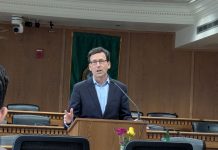Seattle Poised to Remove SEPA Review Hurdle for Most Housing Projects
The Seattle City Council is proposing to scale back the range of construction projects required to get project-level State Environmental Policy Act (SEPA) review in a bid to boost homebuilding. The proposal will go to full council on February 10.
Conservation Groups Join Push Against Seattle Growth Plan
Birds Connect Seattle, Thornton Creek Alliance, and the Orca Conservancy are among the groups trying to send the City of Seattle back to the drawing board on its housing growth plan. They're pushing on behalf of an appeal that has been working its way through the courts since April.
Op-Ed: Katie Wilson Can Be Seattle’s Climate Mayor for Renters
Seattle renters are largely locked out of cost-saving and comfort-improving clean energy appliances, like heat pumps, induction stoves, and solar panels. Sightline's Emily Moore argues that newly inaugurated Mayor Katie Wilson could help change that, in part because Seattle owns its own electric utility.
Ferguson Proposes ‘Unprecedented Sweep’ of Climate Dollars to Balance State Budget
Over $500 million in funding that likely would have been allocated to sustainable transportation and clean energy programs will instead be used to backfill an existing tax credit under Washington Governor Bob Ferguson's budget package. The proposal is drawing fire from climate advocacy groups.
Washington’s First Try at E-bike Rebates Leaves Thousands of Vouchers Unredeemed
84% of Washingtonians offered a $1,200 instant rebate on a new e-bike this spring followed through and made a purchase, compared to just 24% of those who were offered a $300 rebate. The lessons learned during the first rollout of the program are likely to shape the next round of incentives.
City of Seattle Purchases 18-Acre Laurelhurst Property, Scuttling Sprawl Plans
The $64 million sale of the hotly contested Talaris property in Laurelhurst surprised housing advocates who had long been fighting sprawl and pushing for a more forward-thinking urban vision. But with considerable roadblocks to redevelopment still in place, Talaris's future remains uncertain.
Sunday Video: Is Mass Timber Revolutionizing Midrise and Highrise Design?
Uytae Lee of About Here ticks through the design entrants at a recent mass timber architecture competition, showcasing the vast architectural diversity possible with the eco-friendly construction method.
Op-Ed: UW’s Union Bay Hypocrisy: Public Land, Private Fence
The Union Bay Natual Area is 74 acres of public open space with miles of trails, but the University of Washington has rebuffed advocates pushing to remove a fence and add a trail to improve access. Here's why they should reconsider.









